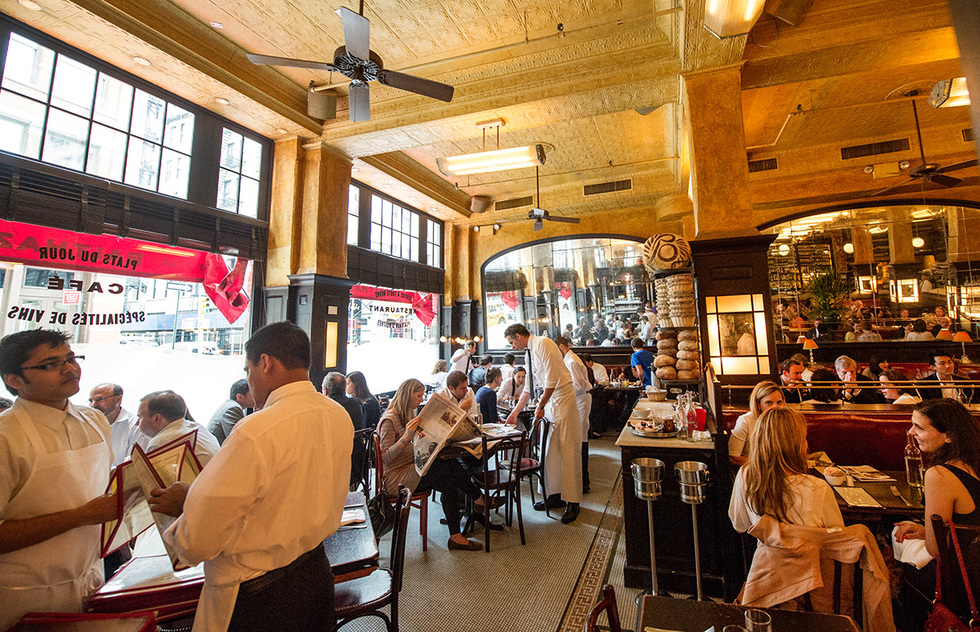How did the surprising volume and variety of NYC restaurants come about?
- New York has a larger and more varied immigrant population than any of the other foremost restaurant cities—and that means ethnic specialties of every sort.
- New York has an unprecedented number of top-notch cooking schools, the offices of international magazines devoted to the art of cooking, and the headquarters of the Food Channel.
- The pace of life here is more hectic and pressured than in other famous restaurant cities, creating a vast population with "no time to cook."
Reservations
Reservations are always a good idea in New York, and a necessity for popular restaurants. Call far ahead for any special meal you don’t want to miss. Most top places start taking reservations 30 days in advance; for the uber-popular joints you’ll need to long onto their reservation service right after midnight on that day to score a meal. Some other strategies include involving your credit card company’s concierge service (some partner with NYC restos); going with a larger group (reservations for 4 or 6 are often easier to snag than those for 2); or going online at 10am or noon the day you want to dine to check for openings, as that’s when general managers tend to post changes, according to a recent article on snagging reservations by the New York Times. OpenTable.com or Resy.com, reservations sites that handles the majority of NYC restaurants, as soon as you decide on the date of your dinner. If you can’t get a reservation for the restaurant you wish to go to through Resy, it does allow you to get on the waitlist for it. To make sure you actually get off the waitlist, download the Resy app, so that it can ping you if a table opens up (email notifications take longer, meaning the reservation will likely be gone by the time you try to nab it).
But if you didn’t call well ahead, don’t despair. Often, early or late hours—between 4:30 and 5:30pm or after 9:30pm—are available, especially on weeknights. And most restaurants have bar seating, for which one needs no reservations. Or go for lunch, which is usually much easier to book without advance notice. If you’re staying at a hotel with a concierge, don’t be afraid to use him or her—a well-connected concierge can often get you into hot spots.
But what if they don’t take reservations? Lots of restaurants, especially at the affordable end of the price continuum, don’t take reservations at all. One of the ways they keep prices down is by packing people in as quickly as possible. Thus, the best cheap and midprice restaurants often have a wait. Again, your best bet is to go early. Often you can get in more quickly on a weeknight. Or just go, knowing that you’re going to have to wait if you head to a popular spot; hunker down with a cocktail at the bar and enjoy the festivities around you.
Tipping
Tipping is easy in New York. The way to do it: Double the 8.75% sales tax and voilà, happy waitstaff. Don’t forget to tip: Waiters make less than minimum wage and are taxed on what the government expects them to make in tips. So when you stiff the waiter, he not only loses that extra bit of income, he still has to pay taxes on it.
Leave $2 per item, no matter how small, for the checkroom attendant. You don’t need to tip the host who escorts you to your table.
Restaurant Week
Restaurant "Week: is a bit of a misnomer: In winter it can last up to a month, and in summer restaurant week it is usually two-weeks long. Week or month, it's a welcome time when, twice a year, some of the best restaurants in town offer three-course prix-fixe meals at almost affordable prices. Restaurant Week began as a one-off in 1992 to welcome delegates to the Democratic National Convention (with the price of a meal $19.92). A hit with New Yorkers as well as visitors, it's become a much-loved tradition, as foodies get a chance to eat at some of the higher-end restaurants in town without breaking the bank. Visit www.nycvisit.com for dates, a list of participating eateries and current prix fixe prices.
Smoking Policy
You cannot light up in any restaurant in the city. Some restaurants entice smokers with back gardens or patios where smoking is permitted, but otherwise, you’ll have to step out to the sidewalk for a cigarette. Some restaurants provide benches, chairs, and ashtrays, but it gets mighty cold out there in the winter.
More Sources for Serious Foodies
Of course, New York has far more fabulous dining than I have room to discuss here—although the listings here are enough to keep you fat and happy for a year, much less the length of a vacation. But if you’d like a wider selection, a few good sources are available online or from your local bookstore.
Your best online sources are the online arm of the weekly New York magazine (www.nymag.com), the New York Times’ arts and lifestyle site, where you can access a database of the paper’s stellar restaurant reviews and blogs; and the national www.eater.com which has a New York section.
Note: This information was accurate when it was published, but can change without notice. Please be sure to confirm all rates and details directly with the companies in question before planning your trip.









